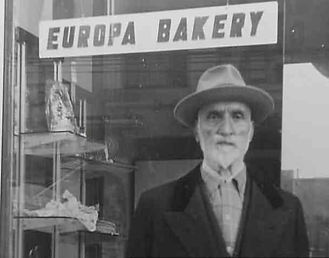
Not allowed to practice other trades back in Europe, many Jews were skilled shop keepers and opened businesses such as this bakery in San Francisco.
Going to Wisconsin sounds like an adventure but you hardly even know the boy. Plus, you can hear your mother admonishing you "No Jewish girl of mine will be caught dead..." with her eyebrows crossed and her finger wagging that made her look more comical than serious.
Your plan is to earn enough money to bring your family over and nothing is going to steer you away from the plan.
You spend the rest of the afternoon walking through the streets of the Hebrew District looking through the shop windows, keeping a watch for "help wanted" signs.
You strike up conversations with random people who look friendly enough to approach. Most of the people in the Hebrew District are Jews from Eastern Europe and snippets of Yiddish drift through the air. Even though you are so far from Russia, it is good to be surrounded by so many reminders of home.
You learn that a shoe factory is need of "girls" to operate the machines. Another tells you of an opening for a housemaid with a wealthy Manhattan family. The last maid left crying for some reason that you don't quite understand, but the job is still open. Someone tells you to go to San Fransisco and open a bakery. Americans in San Fransisco will pay crazy sums of money for home cooked food.
None of these options sound right to you, so you politely smile and keep walking. Finally you come to a sign that says, "Good cooks needed". Your mother's cooking was famous around the shetl and you picked up a few tricks from her.
The store is not much bigger than a tenement bedroom, and from here cooks all sorts of Jewish foods that Mr. Mroz, a Polish Jew, sells from his push cart. Business is booming but his wife recently died of tuberculosis, (also known as the 'Jewish disease' because so many caught this illness of the lungs from living in such crammed conditions) leaving him to take care of the shop by himself.
You accept the job which involves making traditional Jewish foods such as Tzimmes, lockshen, challah bread, and soups. Like all immigrant jobs, the hours are long and the pay often covers the rent and a few necessities, but unlike a factory, working for Mr. Mroz is like being home again.
Over time the two of you bond over stories from the old country. He calls you his adopted Russian daughter. You love working for such a kind man but know that this is not the end for you. Each week you save half of your pay in a wooden box hidden under a floorboard of your tenement apartment. Half of that will go home to your mother and sisters. The other half is for college, where you will train to become a school teacher. Perhaps, you might even open your own school for poor immigrant children one day.
